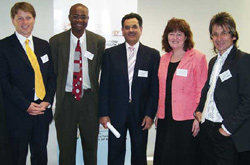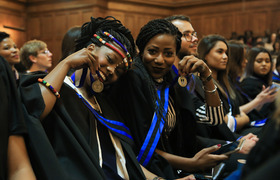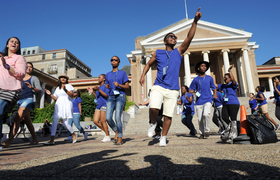Lion's share of national research chairs to UCT
01 October 2007
In the hot seat: Prof Jonathan Blackburn, Prof Kelly Chibale, Prof Iqbal Parker, Prof Anne-Lise Williamson and Prof Frank Brombacher are among the UCT researchers awarded SARChI chairs. (Picture by Prof Ed Rybicki.)
UCT has secured 19 of the next 51 national research chairs, part of the Department of Science and Technology's South African Research Chairs Initiative (SARChI), announced by the Minister of Science and Technology.
Eighteen of these candidates have accepted the award and will take up their positions over the next months.
In December 2006, UCT secured seven of the first 21 chairs, established in strategic research areas at higher education institutions to reverse the country's research decline.
UCT now hosts approximately 35% of the 72 SARChI chairs.
The 18 successful UCT candidates are:
- Prof Jonathan Blackburn (functional proteomics)
- Prof Frank Brombacher (immunology and infectious diseases in Africa)
- Prof Kelly Chibale (drug discovery)
- Dr Marc Combrink (clinical neurosciences)
- Prof Drucilla Cornell (customary law)
- Dr Keertan Dheda (lung infection and inmmunity)
- Prof Jean-Paul Franzidis (minerals beneficiation)
- Prof Carolyn Hamilton (archive and public culture)
- Prof Sue Harrison (bioprocess engineering)
- Prof Bruce Hewitson (climate change)
- Prof David Jacobs (animal evolution and systematics)
- Prof Murray Leibbrandt (poverty and inequality research)
- Prof Diane McIntyre (health and wealth)
- Prof Raj Mesthrie (migration, language and social change)
- Prof Lungisile Ntsebeza (land reform and democracy)
- Prof Edgar Pieterse (urban policy)
- Prof Abdulkader Tayob (African publics and religious values)
- Prof Anna-Lise Williamson (vaccinology).
The DST plans to establish 210 research chairs by 2010, fostering high-level research capacity and creating a "brain gain", Minister of Science and Technology Mosibudi Mangena said at the launch.
Thirty six percent of the current chairs are held by black researchers.
"Through our strategy to reverse the brain drain, we have also made serious international forays during this round," Mangena added. "Within the 32% of externally recruited research chairs, 20% come from countries as diverse as Ethiopia, Nigeria, Kenya, Germany, Sweden, the United Kingdom, Italy and the Netherlands. A handful of these are ex-South Africans whom we have enticed back into the country."
 This work is licensed under a Creative Commons Attribution-NoDerivatives 4.0 International License.
This work is licensed under a Creative Commons Attribution-NoDerivatives 4.0 International License.
Please view the republishing articles page for more information.










